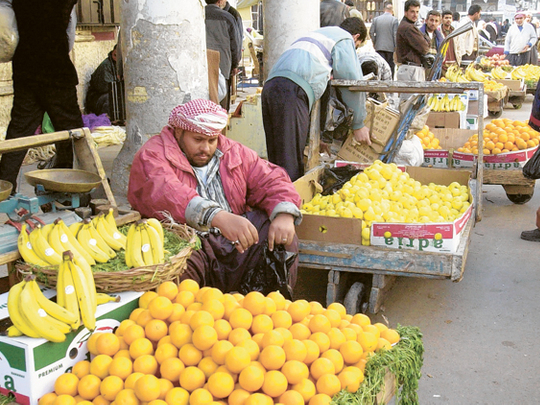
The 23rd Arab summit scheduled to take place in the Iraqi capital of Baghdad occurs at a challenging time for most Arab economies. Suffice to say that adverse econ-omic realities helped convince a large section of the population in numerous Arab countries in the last 15 months to take to the streets and press for socio-political and socio-economic reforms.
Ironically, the Arab Spring has caused econ-omic losses due to the slowdown in activities including disruption of the flow of investments, lower productivity, and damage to infrastructure and tourism prospects. The losses amounted to $56 billion (Dh205 billion) by September 2011 according to Geoplicity, an advisory firm. More recent studies put the losses at $96 billion as of February 2012.
Mohamamd Bu Azizi, the Tunisian who sparked a revolution by setting himself on fire in December 2010, did so for economic reasons. The street vendor with a college degree was prohibited from selling in a public area by orders of a municipality official.
Unemployment is exceptionally challenging, as Arab economies need to create some 100 million job opportunities by 2020.
Certainly, Arab leaders have a serious business to handle while meeting in a one-day summit on March 29 in the now renovated Al Rasheed Hotel.
Alarming statistics
Undoubtedly, Arab leaders do not have the lavishness of overlooking the unemployment challenge partly due to alarming population statistics.
The combined population of Arab countries is estimated at around 350 million, but projected to reach as high as 500 million by 2025 on the back of a 2.3 per cent growth rate.
What's more, about half of the local population in Arab countries is below the age of 20, with millions expected to enter the job market.
One notable approach being followed to help address the job problem relates to providing financial support to small and medium enterprises (SMEs). Much like other places, SMEs are increasingly looked up on the Arab world as a main source of fresh employment opportunities.
The project was born during the second Arab Development, Economic and Social held in Kuwait in January 2009 with a capital of $2 billion. As a testimony to its generosity, Kuwait contributed some $500 million to the fund, which was designed to offer soft financing for small and medium enterprises.
Another means to overcome socio-economic challenges relates to strengthening inter-Arab trade. Sadly, trade levels among Arab countries hover at around 12 per cent of total foreign trade of these countries.
Led by Saudi Arabia, GCC countries are primary contributors to exports of Arab countries.
In reality, Saudi Arabia is the largest exporter of crude oil worldwide.
Similarly, Qatar leads in gas exports.
Several factors explain the low-level of trading among Arab countries.
One such debacle is geography, requiring dependence on air rather than port logistics.
Still, air links among Arab countries are not necessarily frequent or direct. GCC carriers however, are providing a helping hand in connecting Arab cities.
Rail link
Yet the summit participants are likely to revive talks of a possible rail link among the 22 Arab states.
This is uniquely ambitious, as member countries are spread over two continents, namely Asia and Africa, a matter adding to the complexities.
Also, distances among some states, such as that between Morocco and Iraq are exceptionally far.
Visiting Baghdad earlier in the month, I noted determination on the part of city officials in preparing their proud capital for the extraordinary event.
Yet, the ability of the summit participants to address outstanding economic challenges remains unclear, not least reflecting the complexity and magnitude of the problems.
The writer is a Member of Parliament in Bahrain.












